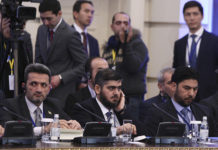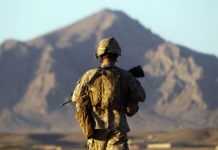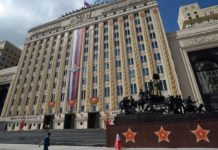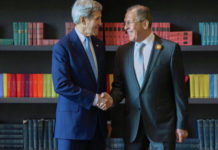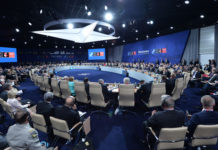Tatiana Ivzhenko
Nezavisimaya Gazeta, August 31, 2016, p. 5
Ukrainian government is going to debate the state strategy “for de-occupation of Crimea and Donets Basin” behind the closed doors.
UKRAINIAN AUTHORITIES ARE AFRAID THAT REGULATION PLANS WILL BE APPROVED IN BEIJING WITHOUT IT
Ukrainian government is going to debate the state strategy “for de-occupation of Crimea and Donets Basin” behind the closed doors. Georgy Tuka, deputy minister of Ukraine for affairs of temporarily occupied territories and temporarily displaced persons and former head of the Lugansk military civil administration reported this.
On Monday, the deputy minister remarked that the strategy would remain secret but a roadmap would be published after its approval. Tuka had to explain what he meant.
In a comment to television channel 112 Ukraine he said that the relevant agencies should take care about military issues. He said, “Another aggravation of the situation (in Donets Basin) that we see now is a matter about which specialist should take care, for example, armed forces and command of the armed forces of Ukraine. Yesterday, I talked about this to Irina Gerashchenko (member of the Ukrainian delegation at the Minsk negotiations of the contact group on regulation. These issues are permanently raised in Minsk but there is no progress. Along with this, there are preliminary agreements, they allegedly promised to stop bombardment of at least children’s institutions from September 1.” With regard to the strategy, according to Tuka, “the first clause of any actions is full ceasefire.”
It should be said in the strategy which steps Kiev is going to take if this clause is fulfilled. Not a single expert of politician is acquainted with the document and knows the detail. Some sources explain that the state strategy speaks about Donets Basin and Crimea. One of them said, “Only the matter of return of Crimea starts not from ceasefire unlike in Donets Basin but from beginning of international judicial processes against Russia.”
Experts in Kiev remind that Ukraine considers both parts of the country to be occupied. That is why the “strategy of de-occupation” may speak about Donets Basin and Crimea. After all, President Petr Poroshenko reported that he ordered development of such document when he read an address to the nation on the eve of the second anniversary of beginning of the Crimean events. Half a year ago, it was planned to develop the strategy by April or May. But at that moment the Ukrainian authorities were occupied with resolving of the political crisis.
If the government approves the document today it will be submitted for consideration to the National Security and Defense Council, its secretary being Alexander Turchinov and chair being the President of Ukraine.
Vladimir Fesenko, director of Penta center of applied political studies, says that secrecy of the document is associated with the fact that it contains information that is a state secret. Along with this, the expert doubts efficiency of the strategy, “Not declarations are needed but actions, not nice-looking formulations on paper but real policy. From this standpoint, in my opinion, it is not worth cherishing plan about Donets Basin and Crimea in one document. These are different processes. It is possible to try to unite them under the slogan of de-occupation but it is necessary to understand that it will be impossible to act similarly in two directions in reality.”
Fesenko remarks that Western partners of Ukraine are not supporters of uniting of the processes, “It is understandable to everyone that Russia will not give Crimea away so simple, they will not even talk about this topic. Now Ukraine can determine its own line of behavior now, the state policy in this direction: to trade or not to trade, how to organize work of the checkpoints etc. Situation regarding Donets Basin is different, dialog is maintained. Of course, reintegration is hardly possible in the near future (nobody in Ukraine will ever agree with “reunion” with incumbent DNR and LNR on their terms). Most likely, the conflict will be frozen. But we should have a scenario of actions, to make provisions for various options of events development: plan A and plan B.”
The expert stresses that in the situation regarding Donets Basin Ukrainian authorities are going to follow the Minsk agreements. Earlier, Petr Poroshenko and representatives of his political team announced that it was necessary to fulfill all clauses of this document related to provision of security first including the last clause of the document about transfer of control over the border with Russia. Afterwards there will be political clauses related to amnesty of defenders of DNR and LNR, organization of elections to the local power bodies and confirmation of broadened powers of authorities of Donets Basin in Ukrainian laws.
DNR and LNR gave a hostile reception to this plan demanding Kiev to observe the Minsk agreements in the consequence in which they were written. This could lead to legalization of the incumbent authorities of the republic and recognition of a special status of DNR and LNR. Experts point out that Ukrainian authorities cannot make such decision because significant part of the society is against this.
A poll conducted a year ago by the Kiev international institute of sociology demonstrated that 79.8% of citizens of Ukraine considered the war in Donets Basin a consequence of “Russian military intervention – armed interference into internal affairs of Ukraine.” Along with this, 77.5% of Ukrainians considered the merger of Crimea with Russia in 2015 “occupation) and 10.8% disagreed with this statement.
Although Ukrainians evaluate the role of Russia negatively in both cases, they view development of the situation related to Crimea and Donets Basin in different ways. With regard to the peninsula, almost nobody speaks about the forceful scenario. In spring of this year, it turned out that more than one-third of Ukrainians did not consider return of Crimea realistic and even important for Ukraine in the near future. But in general Ukrainians wish to solve the problem of Donets Basin as soon as possible and to postpone the problem of Crimea indefinitely.






